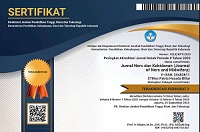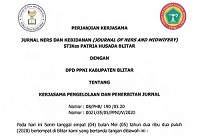Factors Impacting on Clinical Competence of Nursing Student in a Problem based Learning Curriculum during Clinical Learning
DOI:
https://doi.org/10.26699/jnk.v11i1.ART.p039-048Keywords:
clinical competence, clinical learning , problem-based learning , professional nurses , nursing studentAbstract
Clinical competence of Nursing student depends on the supervision received during clinical learning. Supervisors in the clinical area plays an important role for Nursing student when developing their clinical competence in a clinical learning phase. During clinical learning, the expectation is that Nursing student should be able to integrate theory and practice when working with patients. This paper aims to account for those factors that affect competence during clinical learning of Nursing student through a Problem Based Learning curriculum. Thus, the paper reflects a section from a study whose objective was to investigate and outline professional nurses’ understandings of the clinical competencies of final-year Nursing student participating in a Problem Based Learning curriculum during clinical training in the North West Province, South Africa. A qualitative, explorative, descriptive and contextual research design was employed in the main study which had a target population of professional nurses in three hospitals in which the Nursing student following a Problem-Based Learning curriculum were placed for clinical learning. The study employed purposive sampling techniques with semi-structure interviews. In this paper, two themes and six subthemes are ported as follows: 1. that there was dysfunctional collaboration between all stakeholders including facilitators and professional nurses and 2. Professional nurses had attitudes towards Problem Based Learning. Clinical placements required meticulous planning and identification of specific theoretical learning which matched the practical learning requirements pertinent to the Nursing student’ training levels. It is therefore concluded that the development of the clinical competence of Nursing student in a Problem Based Learning curriculum is dependent on stakeholder collaboration.
References
Al-Drees, A. A., Khalil, M. S., Irshad, M., & Abdulghani, H. M. (2015). Students’ perception towards the problem based learning tutorial session in a system-based hybrid curriculum. Saudi medical journal, 36(3), 341. doi: 10.15537/smj.2015.3.10216 https://www.ncbi.nlm.nih.gov/pmc/articles/PMC4381020/.
Allert, C., Dellkvist, H., Hjelm, M., & Andersson, E. K. (2022). Nursing students’ experiences of applying problem‐based learning to train the core competence teamwork and collaboration: An interview study. Nursing open, 9(1), 569-577. https://doi.org/10.1002/nop2.1098.
Ansarian L, Lin TM. (2018). Problem-based Language Learning and Teaching. Singapore: Springer. Available from https://books.google.co.za/books accessed 2023/01/19.
Antohe, I., Riklikiene, O., Tichelaar, E., & Saarikoski, M. (2016). Clinical education and training of Nursing student in four moderately new European Union countries: Assessment of students' satisfaction with the learning environment. Nurse education in practice, 17, 139-144. https://doi.org/10.1016/j.nepr.2015.12.005.
Brink H, Van Der Walt C, Van Rensburg G. Fundamentals of research methodology for health care professionals. 4th ed. Cape Town: Juta and company Ltd. 2018.
Cartwright, P, Bruce, J, Mcinerney, P. Effects of problem-based learning on nurse competence: A systematic review. Journal of Nursing Education and Practice. 2016 7 (10).5430/jnep.v7n4p67. http://dx.doi.org/10.5430/jnep.v7n4p67.
Gewurtz, R. E., Coman, L., Dhillon, S., Jung, B., & Solomon, P. (2016). Problem-based learning and theories of teaching and learning in health professional education. Journal of Perspectives in Applied Academic Practice, 4(1). https://doi.org/10.14297/jpaap.v4i1.194.
Gholami, M., Moghadam, P. K., Mohammadipoor, F., Tarahi, M. J., Sak, M., Toulabi, T., & Pour, A. H. H. (2016). Comparing the effects of problem-based learning and the traditional lecture method on critical thinking skills and metacognitive awareness in nursing students in a critical care nursing course. Nurse education today, 45, 16-21. https://doi.org/10.1016/j.nedt.2016.06.007 . (https://www.sciencedirect.com/science/article/pii/S0260691716301022).
Gray JR, Grove SK. Burns and Grove's The Practice of Nursing Research - E-Book: Appraisal, Synthesis and Generation of Evidence’. 9th edition. Elsevier. St Louise, Missouri. 2020. Available from https://books.google.co.za/books accessed 2023/01/29.
Creswell JW. Research design: Qualitative, quantitative and mixed methods approaches, 4th ed. Los Angeles: Sage. 2014.
Gustin, M. P., Abbiati, M., Bonvin, R., Gerbase, M. W., & Baroffio, A. (2018). Integrated problem-based learning versus lectures: a path analysis modelling of the relationships between educational context and learning approaches. Medical education online, 23(1), 1489690. https://doi.org/10.1080/10872981.2018.1489690.
Günay, U., & Kılınç, G. (2018). The transfer of theoretical knowledge to clinical practice by nursing students and the difficulties they experience: A qualitative study. Nurse education today, 65, 81-86. https://doi.org/10.1016/j.nedt.2018.02.031.
Kahya, E., & Oral, N. (2018). Measurement of clinical nurse performance: Developing a tool including contextual items. Journal of Nursing Education and Practice, 8(6), 112. https://doi.org/10.5430/jnep.v8n6p112.
Lapeña-Moñux, Y. R., Cibanal-Juan, L., Orts-Cortés, M., Maciá-Soler, M., & Palacios-Ceña, D. (2016). Nurses' experiences working with nursing students in a hospital: a phenomenological enquiry. Revista Latino-Americana de Enfermagem, 24. https://doi.org/10.1590/1518-8345.1242.2788.
Lee, M., & Wimmers, P. F. (2016). Validation of a performance assessment instrument in problem-based learning tutorials using two cohorts of medical students. Advances in Health Sciences Education, 21, 341-357. https://doi.org/10.1007/s10459-015-9632-y.
Lu, Y. C. A., Lee, S. H., Hsu, M. Y., Shih, F. F., Yen, W. J., Huang, C. Y., ... & Kuo, C. P. (2022). Effects of Problem-Based Learning Strategies on Undergraduate Nursing Students’ Self-Evaluation of Their Core Competencies: A Longitudinal Cohort Study. International Journal of Environmental Research and Public Health, 19(23), 15825. https://doi.org/10.3390/ijerph192315825.
Matlhaba KL. Perceptions of professional nurses on clinical competence of problem-based learning trained students in North-West Province, South Africa [Masters Dissertation]. Masters North-West University-Mafikeng Campus, South Africa. 2016.
Matlhaba, K. L., & Nkoane, N. L. (2022). Understanding the learning needs to enhance clinical competence of new professional nurses in public hospitals of South Africa: A qualitative study. Belitung Nursing Journal, 8(5), 414-421. https://doi.org/10.33546/bnj.2180.
Mbakaya, B. C., Kalembo, F. W., Zgambo, M., Konyani, A., Lungu, F., Tveit, B., ... & Bvumbwe, T. (2020). Nursing and midwifery students’ experiences and perception of their clinical learning environment in Malawi: a mixed-method study. BMC nursing, 19(1), 1-14. https://doi.org/10.1186/s12912-020-00480-4.
Mumtaz, S., & Latif, R. (2017). Learning through debate during problem-based learning: an active learning strategy. Advances in physiology education, 41(3), 390-394. https://doi.org/10.1152/advan.00157.2016.
Oyeniran, O. I., Chia, T., & Ajagbe, A. O. Impacts of Problem-Based-Learning on Academic Learning Process of Pre-clinical Medical Students in Nile University of Nigeria. DOI: 10.9734/JAMPS/2019/v21i330134.
Rafiee, G., Moattari, M., Nikbakht, A. N., Kojuri, J., & Mousavinasab, M. (2014). Problems and challenges of nursing students’ clinical evaluation: A qualitative study. Iranian journal of nursing and midwifery research, 19(1), 41. Retrieved from http://ijnmr.mui.ac.ir/index.php/ijnmr/article/view/990.
Rakhudu MA, Davhana-Maselesele M. (2016). Collaboration in implementing Problem Based Learning for Nursing Education: Nurse Educators and Managers’ views in South Africa. International Journal for Innovative Education and Research. 4 (06) 1-21.
Sadlo, G. (2014). Using problem-based learning during student placements to embed theory in practice. International Journal of Practice-based Learning in Health and Social Care, 2(1), 6-19. doi:10.11120/pblh.2014.00029.
Sangestani, G., & Khatiban, M. (2013). Comparison of problem-based learning and lecture-based learning in midwifery. Nurse education today, 33(8), 791-795. https://doi.org/10.1016/j.nedt.2012.03.010.
Sayyah, M., Shirbandi, K., Saki-Malehi, A., & Rahim, F. (2017). Use of a problem-based learning teaching model for undergraduate medical and nursing education: a systematic review and meta-analysis. Advances in medical education and practice, 691-700. https://doi.org/10.2147/amep.s143694.
Servant, V. F., & Schmidt, H. G. (2016). Revisiting ‘foundations of problem‐based learning: some explanatory notes’. Medical education, 50(7), 698-701. https://doi.org/10.1111/medu.12803.
South African Nursing Council. Nursing Act (Act No. 33 of 2005). Pretoria: Government Printer. 2005.
Wang, Y. Y., Wan, Q. Q., Lin, F., Zhou, W. J., & Shang, S. M. (2018). Interventions to improve communication between nurses and physicians in the intensive care unit: an integrative literature review. International journal of nursing sciences, 5(1), 81-88. https://doi.org/10.1016/j.ijnss.2017.09.007.
Wosinski, J., Belcher, A. E., Dürrenberger, Y., Allin, A. C., Stormacq, C., & Gerson, L. (2018). Facilitating problem-based learning among undergraduate nursing students: A qualitative systematic review. Nurse education today, 60, 67-74. https://doi.org/10.1016/j.nedt.2017.08.015.
Zhang, J., Shields, L., Ma, B., Yin, Y., Wang, J., Zhang, R., & Hui, X. (2022). The clinical learning environment, supervision and future intention to work as a nurse in nursing students: a cross-sectional and descriptive study. BMC Medical Education, 22(1), 1-9. https://doi.org/10.1186/s12909-022-03609-y.
Downloads
Published
How to Cite
Issue
Section
License
Copyright (c) 2024 Jurnal Ners dan Kebidanan (Journal of Ners and Midwifery)

This work is licensed under a Creative Commons Attribution-ShareAlike 4.0 International License.






